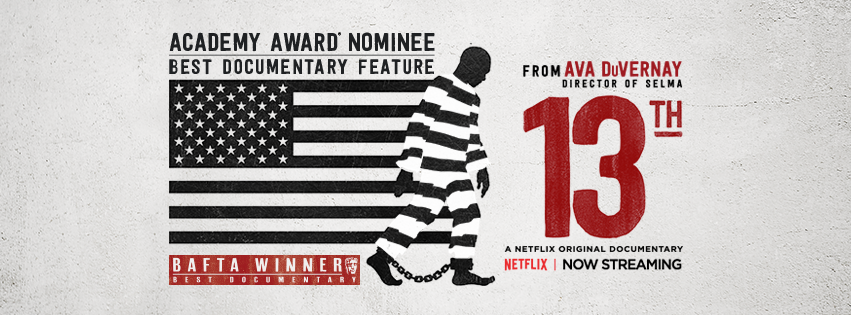Amidst the fervor of the current protests and the BLM movement that has erupted after the murder of George Floyd, many people have been circulating resources to help further the education on racism. These resources are meant to be ways in which white people and non-black people of color can educate themselves on racism and the structures and institutions that perpetuate it, so that black people are relieved from the emotional and mental burden of doing it for us. Hundreds of lists, tweets, and instagram posts have circulated with countless options to deepen one’s understanding of the history of race in this country.
Amongst these lists you may have seen the Netflix documentary 13th, released in 2016 and directed by Ava DuVernay. I am here to tell you that if you are white or non-black and have not already seen 13th, you must watch it as soon as possible. Even if you have seen it, I would recommend watching it again; I have seen it three times now and I continue to learn and retain more from it with each watch.
13th explores the history of racial inequality in the United States, with a focus on the systems that led to the age of mass incarceration we are living in today. It explains how the 13th amendment, which abolished slavery, actually states: “Neither slavery nor involuntary servitude, except as a punishment for crime whereof the party shall have been duly convicted, shall exist within the United States, or any place subject to their jurisdiction.” The phrase “except as a punishment for crime” is known as the 13th amendment loophole or the loophole clause—because it provides grounds for an exception.
The documentary explains how this loophole was exploited almost as soon as the 13th amendment was ratified, because the free labor of prisoners provided economic gains to the Reconstruction-era South. Ever since their liberation from slavery, black people have been incarcerated at extremely disproportionate rates in the United States. This has led to the US having the highest rates of incarceration in the entire world: 1 out of 4 prisoners in the world—a full 25%—are locked up in the United States, while the US has less than 5% of the world’s population.
DuVernay also dives into the disenfranchisement of the African American community, lynching and the Jim Crow era, and the war on drugs and the law and order period—particularly how they led to mass incarceration. There is even incriminating testimony from politicians and government officials that they knew they were targeting black and brown communities with the war on drugs and law and order polices. Then, the documentary examines the prison-industrial complex and how it exists to produce profits for large incorporations.
It is absolutely essential for every white and non-black person of color in the United States to watch 13th. Sometimes we hear the terms “institutionalized racism” or “structural racism” thrown around without actually knowing what they mean; this documentary will explain it perfectly. And I encourage you to take it a step further, and watch 13th with your family and friends. Our job as allies is not only to educate ourselves, but also to help educate others. 13th was one of my first exposures to actually understanding the structures and systems that perpetuate racism and injustice in our society, and it has given me a foundation to dive even further into black liberation and abolitionist theory. While education alone is not enough and we must also take real, concrete actions towards the fight for justice, 13th is a wonderful place to start.

